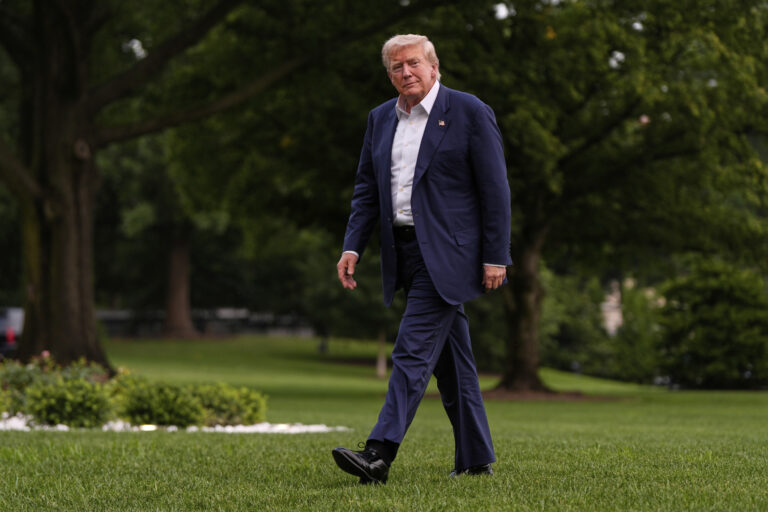Donald Trump’s public approval has dropped to its lowest level in months, according to newly released polling data.
The latest Reuters/Ipsos poll shows that Trump’s approval rating has dropped to 40 percent, with 56 percent disapproving, giving him a net approval rating of -16 points.
Trump previously had a net approval rating of -16 in late June. But at that point, 41 percent approved and 57 percent disapproved, so the latest result marks his lowest approval rating of his second term.
The latest YouGov/Economist poll also showed Trump’s approval rating at its lowest level yet, with 40 percent approving and 55 percent disapproving.
The polls are in line with other recent surveys which have also shown Trump’s support drop to its lowest point so far. A recent Navigator Research put the president at 42 percent approval and 54 percent disapproval, bringing his net approval rating down to -12 points, while Gallup and The Bullfinch Group report even lower ratings, with net approval as low as -21.

Julia Demaree Nikhinson/AP
Trump’s Approval Rating Stagnates
The surveys also mirror recent polls, which show Trump’s approval rating stagnating.
The YouGov/Economist poll only showed a marginal change in Trump’s approval rating from last week when 41 percent approved and 55 percent disapproved of his job performance. The president’s approval rating has remained between 40 and 42 percent since mid -June, while his disapproval rating has remained between 53 and 55 percent.
The Reuters/Ipsos poll showed slightly more movement, with Trump’s approval rating decreasing by 1 point and his disapproval increasing by 2 points since last week. But like the YouGov/Economist polls, his approval rating has remained between 40 and 42 percent since mid-May, while his disapproval rating has sat between 52 and 56 percent.
Similarly, McLaughlin & Associates, Quantus Insights, RMG Research, and Emerson College all show his approval holding steady between 46 and 52 percent in recent months, with little movement in net approval.
According to Quantus pollster Jason Corley, that is because Trump is still overwhelmingly popular among Republicans, but his support has not seen much of a boost among key demographics such as women, young voters and independents. “For a president who thrives on momentum, the static nature of these numbers is a signal: the base is holding, but the middle isn’t moving,” Corley wrote in a blog post.
The Reuters/Ipsos survey reflects this trend, showing a highly polarized electorate. According to the poll, 83 percent of Republicans back Trump, compared to just 3 percent of Democrats and about one-third of independents. That is largely unchanged from a month ago, when 84 percent of Republicans said they approve of Trump, as well as 4 percent of Democrats and 40 percent of independents.
The latest YouGov/Economist poll also underscores the deep polarization that continues to define the American electorate, with support for Trump largely divided along partisan lines. However, support has only shifted marginally since June.
Republican approval of Trump remains overwhelmingly high, though it dipped slightly from 89 percent in June to 86 percent in July. Among Democrats, approval rose modestly from 3 percent to 6 percent, while independents showed a slight decline, from 34 percent to 29 percent.
And both polls showed only marginal changes in Trump’s approval on issues like the economy, inflation and immigration—which were cornerstones of his campaign.
The Economist/YouGov poll found that approval of Trump’s handling of the economy—long seen as one of his strongest areas—dipped slightly from 43 percent in June to 40 percent in July, while disapproval remained at 51 percent.
On inflation and prices, where voter concern remains especially high, approval declined from 35 percent to 34 percent, and disapproval stayed at 59 percent.
Similarly, on immigration, a central pillar of Trump’s platform, approval dropped from 47 percent to 44 percent, while disapproval remained at 50 percent. All of these movements fall within the poll’s margin of error.
Findings from the latest Reuters/Ipsos poll reinforce the overall stability of public opinion. That survey showed a modest increase in Trump’s economic approval—from 35 percent in June to 38 percent in July—and a 2-point rise on immigration, from 41 percent to 43 percent. But like the Economist/YouGov data, these changes remain statistically insignificant.
Trump’s Approval Rating Shows Signs Of Recovery
Some polls, however, show signs of recovery for the president. Newsweek’s approval tracker shows Trump’s net approval at -6 (45 percent approve, 51 percent disapprove), up from -7 at the end of last week and -10 earlier in the week.
The latest Morning Consult survey showed Trump’s approval rising to 47 percent, up 2 points from the previous week, while his disapproval dropped to 50 percent, down 2 points. His net approval rating improved from -7 points to -3 points.
It comes as the U.S. economy has mostly avoided a feared downturn from Trump’s tariffs introduced earlier this year, ABC News reported.
Meanwhile, unemployment remains near historic lows, and while job growth has cooled, it is still strong.
However, inflation hit 2.7 percent in June, up from 2.4 percent the previous month, according to the Consumer Price Index, but is still lower than when Trump took office.
Overall, economists estimate the economy grew at a 2.3-percent annual rate from April to June, bouncing back from a -0.5-percent decline in the previous quarter.


